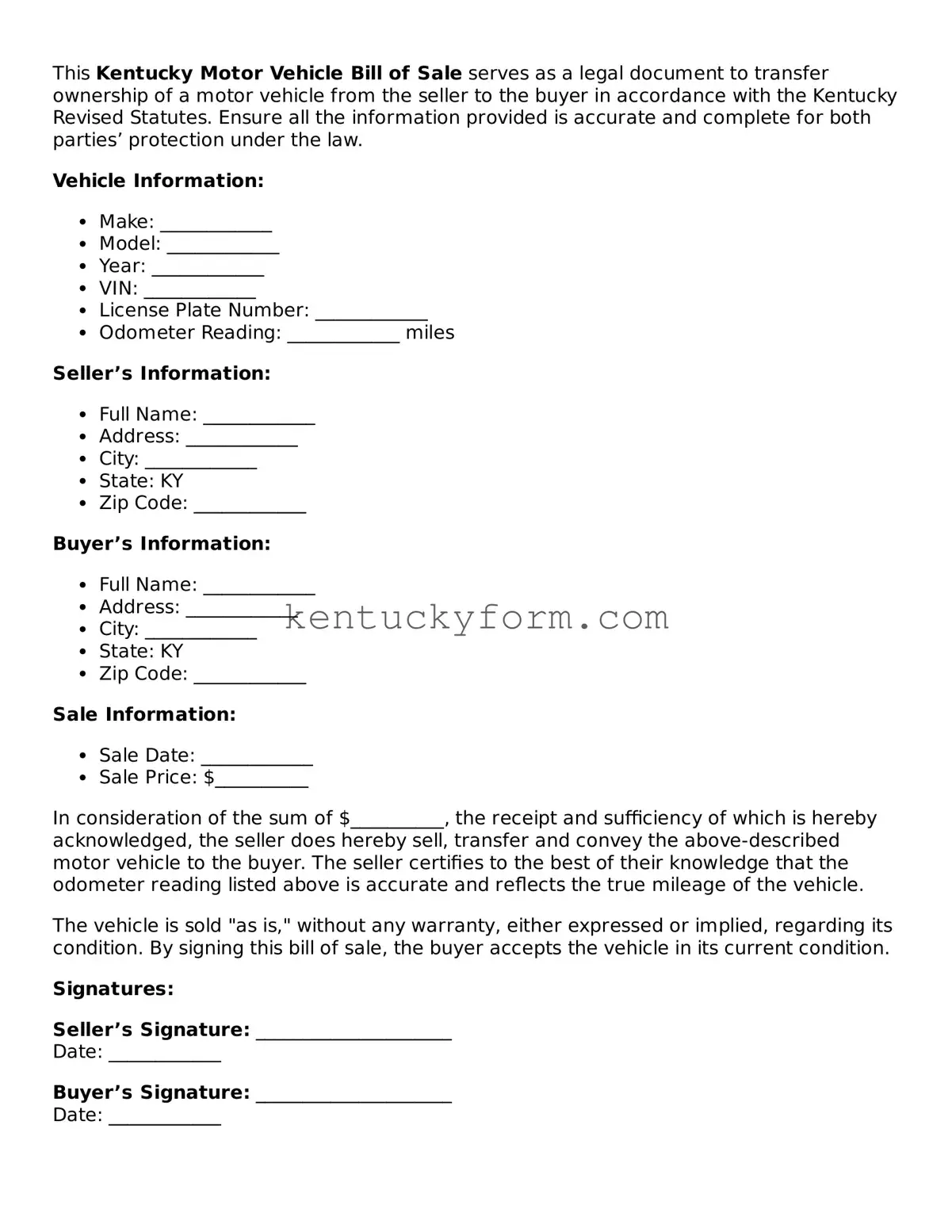A Warranty Deed is one similar document to the Kentucky Motor Vehicle Bill of Sale. Both documents serve as proof of a transaction, with the Warranty Deed specifically used for real estate transactions. It guarantees that the seller holds the title to the property and has the right to sell it, just as the Bill of Sale guarantees that the seller owns the vehicle and can legally transfer ownership. Each document also offers some protection to the buyer, ensuring that the seller has the legal rights they claim to have.
An Aircraft Bill of Sale serves a purpose similar to that of the Kentucky Motor Vehicle Bill of Sale, but it is used for the sale of airplanes. This document provides evidence that an aircraft has been sold and specifies the details of the sale, including information about both the seller and the buyer, as well as the sale price and description of the aircraft, akin to what is detailed for a vehicle in the Motor Vehicle Bill of Sale.
An Equipment Bill of Sale shares similarities too, being another type of sales document that proves the transfer of ownership of equipment from a seller to a buyer. Whether it’s construction equipment, office equipment, or any other kind, like the Motor Vehicle Bill of Sale, it details the transaction, including the names and addresses of both parties, the description of the equipment, the sale price, and the date of the sale.
Another similar document is the Boat Bill of Sale, which, as the name suggests, is used when selling or buying a boat. It functions like the Motor Vehicle Bill of Sale by providing a written record of the transaction, including the vessel’s details, purchase price, and both parties' details, to officially transfer ownership and possibly register the vessel under the new owner’s name.
The Promissory Note is also related in terms of its function in financial transactions, but it outlines a promise to pay back a debt rather than the sale of an item. Both the Promissory Note and the Motor Vehicle Bill of Sale establish terms agreed upon by the parties involved, with the former focusing on repayment terms and the latter on the details of the vehicle’s sale.
A General Bill of Sale also mirrors the Kentucky Motor Vehicle Bill of Sale but is used for personal property items that do not necessarily fit into categories like vehicles, boats, or equipment. It documents the sale of items like furniture or electronics, detailing the transaction in a manner that proves transfer of ownership, similar to the motor vehicle document.
The Quitclaim Deed, like the Motor Vehicle Bill of Sale, is a legal document transferring one person’s interest in a piece of property to another. However, it is specifically used for real estate and offers no guarantees on the title’s status, making it slightly different in terms of the protection it offers to the buyer. It is similar in its function of transferring rights or interest from one party to another.
A Firearm Bill of Sale closely resembles the Motor Vehicle Bill of Sale in that it is a specific document used for the sale of a gun. This form acquires importance due to the legal implications and requirements surrounding the transfer of firearms, ensuring that the sale complies with state laws and regulations, as does the sale of a vehicle with its bill of sale.
A Loan Agreement is akin to the Kentucky Motor Vehicle Bill of Sale in its establishment of an agreement between parties, but it specifically details the terms under which one party lends money to another. While it doesn’t deal with the sale of an item, both documents outline terms agreed upon by the involved parties, including repayment for the Loan Agreement and sale details for the Bill of Sale.
Lastly, a Bill of Sale for Business is related to the Kentucky Motor Vehicle Bill of Sale, as it documents the sale of a business from one person or entity to another. It includes details about the sale similar to those found in a Motor Vehicle Bill of Sale, such as the names of the buyer and seller, a description of the business being sold, and the purchase price, serving as proof of the transaction and transfer of ownership.

